| Listing 1 - 10 of 60 | << page >> |
Sort by
|
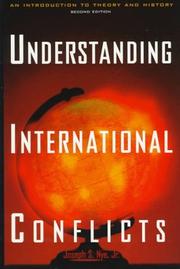
ISBN: 0321011015 Year: 1997 Publisher: New York Longman
Abstract | Keywords | Export | Availability | Bookmark
 Loading...
Loading...Choose an application
- Reference Manager
- EndNote
- RefWorks (Direct export to RefWorks)
Book
ISBN: 9781586488918 9781586488925 9781610390699 1610390695 1586488929 1586488910 Year: 2011 Publisher: New York Public Affairs
Abstract | Keywords | Export | Availability | Bookmark
 Loading...
Loading...Choose an application
- Reference Manager
- EndNote
- RefWorks (Direct export to RefWorks)
In the era of Kennedy and Khrushchev, power was expressed in terms of nuclear missiles, industrial capacity, numbers of men under arms, and tanks lined up ready to cross the plains of Eastern Europe. By 2010, none of these factors confer power in the same way: industrial capacity seems an almost Victorian virtue, and cyber threats are wielded by non-state actors. Politics changed, and the nature of power--defined as the ability to affect others to obtain the outcomes you want--had changed dramatically. Power is not static; its story is of shifts and innovations, technologies and relationships.Joseph Nye is a long-time analyst of power and a hands-on practitioner in government. Many of his ideas have been at the heart of recent debates over the role America should play in the world: his concept of soft power has been adopted by leaders from Britain to China; smart power has been adopted as the bumper-sticker for the Obama Administration's foreign policy. This book is the summation of his work, as relevant to general readers as to foreign policy specialists. It is a vivid narrative that delves behind the elusive faces of power to discover its enduring nature in the cyber age.Bron : http://www.bol.com
Power (Social sciences) --- Pouvoir (sciences sociales) --- Relations pouvoir civil-pouvoir militaire --- Politique économique --- Culture technologique --- Nouvelles technologies de l'information et de la communication --- Internet --- Systèmes informatiques --- Société civile --- Innovations --- Aspect politique --- Mesures de sûreté --- International relations. Foreign policy --- Political sociology --- Pouvoir (Sciences sociales) --- Technologies de l'information et de la communication --- Politique économique. --- Relations pouvoir civil-pouvoir militaire. --- Culture technologique. --- Société civile. --- Innovations technologiques. --- Aspect politique. --- Mesures de sûreté. --- Macht --- Politiek --- Buitenlandse politiek --- Toekomstbeeldvorming --- Trends --- Toekomstvisie --- Trend --- Maatschappij --- Film --- Innovation. --- Politique économique --- Systèmes informatiques --- Société civile. --- Mesures de sûreté.
Book
ISBN: 0300031408 9780300031409 Year: 1984 Publisher: New Haven, Conn.
Abstract | Keywords | Export | Availability | Bookmark
 Loading...
Loading...Choose an application
- Reference Manager
- EndNote
- RefWorks (Direct export to RefWorks)
International relations. Foreign policy --- United States --- Soviet Union --- Foreign relations --- Soviet UnionForeign relations --- U.S.S.R. Buitenlandse politiek. Verenigde Staten. --- Etats-Unis. Politique extérieure. U.R.S.S. --- U.R.S.S. Politique extérieure. Etats-Unis. --- Verenigde Staten. Buitenlandse politiek. U.S.S.R. --- United States - Foreign relations - Soviet Union --- Soviet Union - Foreign relations - United States --- United States of America
Book
ISBN: 9780691158365 Year: 2013 Publisher: Princeton Princeton University Press
Abstract | Keywords | Export | Availability | Bookmark
 Loading...
Loading...Choose an application
- Reference Manager
- EndNote
- RefWorks (Direct export to RefWorks)
Presidents --- United States --- Political leadership --- Executive power --- Politics and government
Book
ISBN: 9780745690070 9780745690063 0745690076 0745690068 Year: 2015 Publisher: Cambridge Polity
Abstract | Keywords | Export | Availability | Bookmark
 Loading...
Loading...Choose an application
- Reference Manager
- EndNote
- RefWorks (Direct export to RefWorks)
For more than a century, the United States has been the world's most powerful state. Now some analysts predict that China will soon take its place. Does this mean that we are living in a post-American world ? Will China's rapid rise spark a new Cold War between the two titans ? In this compelling essay, world renowned foreign policy analyst, Joseph Nye, explains why the American century is far from over and what the US must do to retain its lead in an era of increasingly diffuse power politics. America's superpower status may well be tempered by its own domestic problems and China's economic boom, he argues, but its military, economic and soft power capabilities will continue to outstrip those of its closest rivals for decades to come.
Power (Social sciences) --- History --- United States --- Politics and government --- Economic conditions --- Foreign relations --- S09/0610 --- S38/0950 --- Empowerment (Social sciences) --- Political power --- Exchange theory (Sociology) --- Political science --- Social sciences --- Sociology --- Consensus (Social sciences) --- China: Foreign relations and world politics--China and USA: since 1949 --- Works not related to China and the Far East--Foreign relations and world politics: USA and Canada --- Foreign relations. --- Consensus (Social sciences)History --- Works not related to China and the Far East--Foreign relations and world politics: USA and CanadaUnited States --- United StatesPolitics and government --- 20th century --- Power (Social sciences) - United States - History - 20th century --- United States - Politics and government - 20th century --- United States - Economic conditions - 20th century --- United States - History - 20th century --- United States - Foreign relations
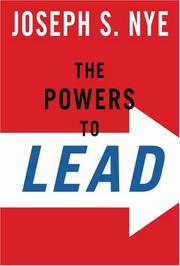
ISBN: 9780195335620 0195335627 0199754136 9786611162405 0198044291 128116240X 1435638913 9780198044291 9781435638914 9781281162403 6611162402 Year: 2008 Publisher: Oxford ; New York : Oxford University Press,
Abstract | Keywords | Export | Availability | Bookmark
 Loading...
Loading...Choose an application
- Reference Manager
- EndNote
- RefWorks (Direct export to RefWorks)
What qualities make a leader succeed in business or politics? In an era when the information revolution has dramatically changed the playing field, when old organizational hierarchies have given way to fluid networks of contacts, and when mistrust of leaders is on the rise, our ideas about leadership are clearly due for redefinition.With The Powers to Lead, Joseph S. Nye offers a sweeping look at the nature of leadership in today's world, in an illuminating blend of history, business case studies, psychological research, and more. As he observes, many now believe that the more authoritarian and coercive forms of leadership--the hard power approaches of earlier military-industrial eras--have been largely supplanted in postindustrial societies by soft power approaches that seek to attract, inspire, and persuade rather than dictate. Nye argues, however, that the most effective leaders are actually those who combine hard and soft power skills in proportions that vary with different situations. He calls this smart power. Drawing examples from the careers of leaders as disparate as Gandhi, Churchill, Lee Iacocca, and George W. Bush, Nye uses the concept of smart power to shed light on such topics as leadership types and skills, the needs and demands of followers, and the nature of good and bad leadership in terms of both ethics and effectiveness. In one particularly instructive chapter, he looks in depth at contextual intelligence--the ability to understand changing environments, capitalize on trends, and use the flow of events to implement strategies.Thoroughly grounded in the real world, rich in both analysis and anecdote, The Powers to Lead is sure to become a modern classic, a concise and lucid work applicable to every field, from small businesses and nonprofit organizations to nations on the world stage. This paperback edition includes a new preface by the author.
Political leadership. --- Leadership. --- Executive ability. --- Interpersonal communication. --- Leadership politique --- Leadership --- Aptitude pour la direction --- Communication interpersonnelle --- Political leadership --- Executive ability --- Interpersonal communication --- Political Science --- Law, Politics & Government --- Political Theory of the State --- Administrative ability --- Executive skills --- Communication --- Interpersonal relations --- Ability --- Command of troops --- Followership --- E-books
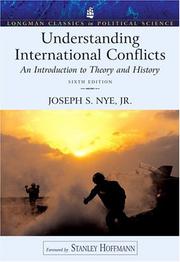
ISBN: 9780321393951 0321393953 Year: 2007 Publisher: New York : Pearson/Longman,
Abstract | Keywords | Export | Availability | Bookmark
 Loading...
Loading...Choose an application
- Reference Manager
- EndNote
- RefWorks (Direct export to RefWorks)
International relations. --- War (International law) --- World politics --- Relations internationales --- Guerre (Droit international) --- Politique mondiale --- Geografie --- Sociale geografie --- Politieke Geografie. --- War (International law).
Book
ISBN: 0029224608 Year: 1986 Publisher: New York Free Press
Abstract | Keywords | Export | Availability | Bookmark
 Loading...
Loading...Choose an application
- Reference Manager
- EndNote
- RefWorks (Direct export to RefWorks)
Deterrence (Strategy) --- -Nuclear warfare --- -623.454.8 --- 17 --- Atomic warfare --- CBR warfare --- Nuclear strategy --- Nuclear war --- Thermonuclear warfare --- War --- Nuclear crisis control --- Nuclear weapons --- Moral and ethical aspects --- Nuclear weaponsMoral and ethical aspects --- Nuclear warfare --- 623.454.8
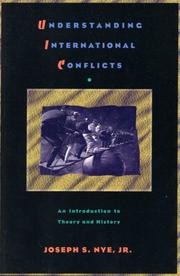
ISBN: 0065007204 Year: 1993 Publisher: New York (N.Y.): HarperCollins college
Abstract | Keywords | Export | Availability | Bookmark
 Loading...
Loading...Choose an application
- Reference Manager
- EndNote
- RefWorks (Direct export to RefWorks)
327.5 --- International relations --- World politics --- -327.5 --- Colonialism --- Global politics --- International politics --- Political history --- Political science --- World history --- Eastern question --- Geopolitics --- International organization --- Coexistence --- Foreign affairs --- Foreign policy --- Foreign relations --- Global governance --- Interdependence of nations --- International affairs --- Peaceful coexistence --- World order --- National security --- Sovereignty --- Internationale conflicten. Internationale spanningen. Internationale blokvorming. Veiligheidspolitiek --- International relations. --- 327.5 Internationale conflicten. Internationale spanningen. Internationale blokvorming. Veiligheidspolitiek
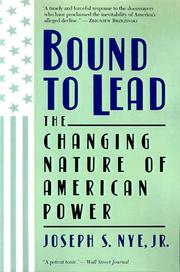
ISBN: 0465007449 0465001777 0465007430 9780465001774 0465001769 9780465001767 0786740930 9780465007431 Year: 1990 Publisher: New York Basic Books
Abstract | Keywords | Export | Availability | Bookmark
 Loading...
Loading...Choose an application
- Reference Manager
- EndNote
- RefWorks (Direct export to RefWorks)
Refuting the claim that mainstream media has a liberal slant, the author exposes the fallacy of a left-wing conspiracy, arguing that it is corporate news structure that determines what the public sees and hears in broadcast or print media.
World politics --- -Power (Social sciences) --- Geopolitics --- -973.92 --- Empowerment (Social sciences) --- Political power --- Exchange theory (Sociology) --- Political science --- Social sciences --- Sociology --- Consensus (Social sciences) --- Colonialism --- Global politics --- International politics --- Political history --- World history --- Eastern question --- International organization --- International relations --- History --- -United States --- Foreign relations --- -World politics --- -327 --- -#SBIB:327.1H20 --- #SBIB:327H15 --- #ECO:01.01:economie algemeen --- #ECO:01.11:economie politiek economisch perspectief --- #ECO:05.04:landen VSA Canada --- 327 Buitenlandse betrekkingen. Buitenlandse politiek. Internationale betrekkingen. Internationale politiek. Wereldpolitiek --- Buitenlandse betrekkingen. Buitenlandse politiek. Internationale betrekkingen. Internationale politiek. Wereldpolitiek --- -Sociologie van de internationale betrekkingen: algemeen --- Buitenlandse politiek: Noord-Amerika --- United States --- U.S.A. --- Jungtinės Amerikos valstybės --- Soedinennye Shtaty Si︠e︡vernoĭ Ameriki --- Soedinennye Shtaty Severnoĭ Ameriki --- Si︠e︡vero-Amerikanskīe Soedinennye Shtaty --- Severo-Amerikanskie Soedinennye Shtaty --- Zlucheni Derz︠h︡avy --- USA --- US --- Arhab --- Ar. ha-B. --- Artsot ha-Berit --- ولايات المتحدة الامريكية --- Wilāyāt al-Muttaḥidah al-Amirīkīyah --- ABSh --- Amerika Birlăshmish Shtatlary --- ABŞ --- Amerika Birlăşmi Ştatları --- Forente stater --- Spojené staty americké --- Severo-Amerikanskie Shtaty --- Sjedinjene Američke Države --- Zʹi︠e︡dnani Derz︠h︡avy Ameryky --- Amerikai Egyesült Államok --- Yhdysvallat --- Verenigde Staten --- Egyesült Államok --- Hiwsisayin Amerikayi Miatsʻeal Tērutʻiwnkʻ --- Estados Unidos de América --- United States of America --- Fareyniḳṭe Shṭaṭn --- Artzois Ha'bris --- Estados Unidos da América do Norte --- SShA --- Soedinennye Shtaty Ameriki --- VSA --- États-Unis d'Amérique --- Vereinigte Staaten von Amerika --- Stati Uniti d'America --- Estados Unidos --- EE.UU. --- Stany Zjednoczone --- ĒPA --- Amerika Qūrama Shtattary --- Amerika Qŭshma Shtatlari --- SAD --- Saharat ʻAmērikā --- Hēnomenai Politeiai Amerikēs --- ZSA --- Mei-kuo --- Meiguo --- Mei guo --- ZDA --- Združene države Amerike --- U.S. --- America (Republic) --- Amirika Carékat --- Verenigde State van Amerika --- VS --- ولايات المتحدة --- Wilāyāt al-Muttaḥidah --- ولايات المتّحدة الأمريكيّة --- Wilāyāt al-Muttaḥidah al-Amrīkīyah --- Estatos Unitos --- Estatos Unitos d'America --- Ètats-Unis d'Amèrica --- Estaos Xuníos d'América --- Estaos Xuníos --- Tetã peteĩ reko Amérikagua --- Istadus Unidus --- Amerika Birlăşmiş Ştatları --- Amerika ka Kelenyalen Jamanaw --- Bí-kok --- Amerika Qushma Shtattary --- AQSh --- Злучаныя Штаты Амерыкі --- Zluchanyi︠a︡ Shtaty Ameryki --- Yunaeted Stet blong Amerika --- Yunaeted Stet --- Vaeinigte Staatn --- Vaeinigte Staatn vo Amerika --- Stadoù-Unanet Amerika --- Sŭedineni amerikanski shtati --- САЩ --- SASht --- Съединените щати --- Sŭedinenite shtati --- Америка (Republic) --- Amerika (Republic) --- Estats Units d'Amèrica --- Америкӑри Пӗрлешӳллӗ Штатсем --- Amerikări Pĕrleshu̇llĕ Shtatsem --- Stati Uniti --- SUA (Stati Uniti d'America) --- Unol Daleithiau America --- Unol Daleithiau --- Amerikas Forenede Stater --- Vereinigte Staaten --- Wááshindoon Bikéyah Ałhidadiidzooígíí --- Zjadnośone staty Ameriki --- Ameerika Ühendriigid --- Ηνωμένες Πολιτείες της Αμερικής --- Hēnōmenes Politeies tēs Amerikēs --- Η.Π.Α. --- Ē.P.A. --- Usono --- Unuiĝintaj Ŝtatoj de Ameriko --- Американь Вейтьсэндявкс Штаттнэ --- Amerikanʹ Veĭtʹsėndi︠a︡vks Shtattnė --- Ameriketako Estatu Batuak --- Feriene Steaten --- Feriene Steaten fan Amearika --- FS --- Stâts Unîts di Americhe --- Stâts Unîts --- Stáit Aontaithe Mheiriceá --- Steatyn Unnaneysit America --- Steatyn Unnaneysit --- S.U.A. --- Na Stàitean Aonaichte --- NSA --- Mî-koet --- 미국 --- Miguk --- Amerikayi Miatsʻyal Nahangner --- Miatsʻyal Nahangner --- -Geopolitics --- Power (Social sciences) --- #SBIB:327.1H20 --- 327 --- Coexistence (World politics) --- Peaceful coexistence --- Sociologie van de internationale betrekkingen: algemeen --- International relations. Foreign policy --- 1945-1989 --- 1945 --- 20th century --- Geopolitics - United States - History - 20th century. --- Journalism --- Journalistic ethics --- Professional ethics --- Bias in journalism --- Slanted news --- Objectivity --- Press and propaganda --- Moral and ethical aspects --- World politics - 1945 --- -Geopolitics - United States - History - 20th century --- World politics - 1945-1989 --- United States - Foreign relations - 1945-1989 --- Pouvoir (sciences sociales) --- Géopolitique --- Relations internationales --- Equilibre des puissances --- États-Unis --- 20e siècle --- Relations extérieures --- Géopolitique --- États-Unis --- 20e siècle --- Relations extérieures
| Listing 1 - 10 of 60 | << page >> |
Sort by
|

 Search
Search Feedback
Feedback About UniCat
About UniCat  Help
Help News
News